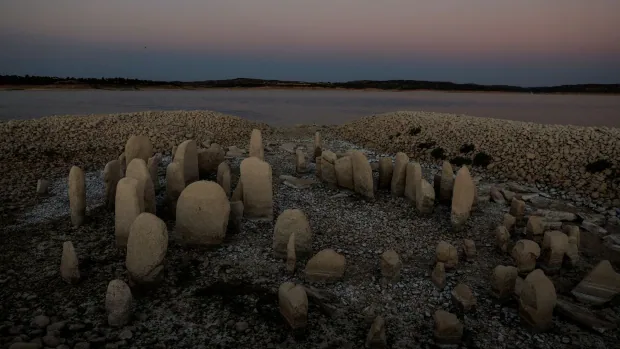Weeks of baking drought throughout Europe have seen water ranges in rivers and lakes fall to ranges few can bear in mind, exposing long-submerged treasures and some undesirable hazards.
In Spain, struggling its worst drought in many years, archaeologists have been delighted by the emergence of a prehistoric stone circle dubbed the “Spanish Stonehenge” that’s often lined by the waters of a dam.
Solely seen 4 occasions since submerged
Formally generally known as the Dolmen of Guadalperal, the stone circle at present sits absolutely uncovered in a single nook of the Valdecanas reservoir, within the central province of Caceres, the place authorities say the water degree has dropped to twenty-eight per cent of capability.
It was first found by German archaeologist Hugo Obermaier in 1926, however the space was flooded in 1963 in a rural improvement venture below Francisco Franco’s dictatorship.
Since then, it has solely turn out to be absolutely seen 4 occasions.

Reminiscences of previous droughts have additionally been rekindled in Germany by the reappearance of so-called “starvation stones” alongside the River Rhine.
Stones warn of previous droughts
Many such stones have turn out to be seen alongside the banks of Germany’s largest river in current weeks.
Bearing dates and other people’s initials, their re-emergence is seen by some as a warning and reminder of the hardships folks confronted throughout former droughts.
Dates seen on stones seen in Worms, south of Frankfurt, and Rheindorf, close to Leverkusen, included 1947, 1959, 2003 and 2018.

One other of Europe’s mighty rivers, the Danube, has fallen to one among its lowest ranges in nearly a century on account of the drought, exposing the hulks of greater than 20 German warships sunk through the Second World Struggle close to Serbia’s river port city of Prahovo.
The vessels have been amongst a whole bunch scuttled alongside the Danube by Nazi Germany’s Black Sea fleet in 1944 as they retreated from advancing Soviet forces, and nonetheless hamper river visitors throughout low water ranges.

Italy has declared a state of emergency for areas across the River Po, and in late July, a beforehand submerged 450-kg (1,000-pound) Second World Struggle bomb was found within the low-running waters of the nation’s longest river.
Round 3,000 folks dwelling close to the northern village of Borgo Virgilio, near the town of Mantua, have been evacuated whereas navy specialists defused and carried out a managed explosion of the U.S.-manufactured system earlier this month.

